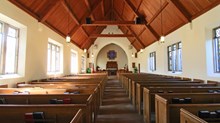The Legacy of Willow Creek 5

This is the fifth in a series of five on the Legacy of Willow Creek Community Church [WCCC]. WCCC became the most influential church in the evangelical world in the late 20th Century, and with that influence came scrutiny of the corruptions revealed. Those corruptions are part of the WCCC story and there’s no hiding the truths of that story. As Saul’s story was told, as David’s story was told, as the ugly fight between Peter and Paul was told … so the ugly parts of WCCC’s story need to be told.
Our faith is a faith in the grace of God for sinners who are corrupted. That grace was part of WCCC’s gospel preaching, but that grace to work its graciousness requires us to own up, and one theme of this series is the truth that WCCC needs to own. I begin with a strong statement, but it has to be seen for what it is.
WCCC illustrates the inevitable implication of a church proudly thinking it was the BEST CHURCH IN THE WORLD. This was for me the most irritating and disappointing feature of Willow over our years of attending and even participating.
There was a culture at Willow that said, “We are special” that often fell over the line into “We are the best.” There is no such thing as the best church because every church is local and the best church is the one in your community. God is not choosing the Best Church Ever and God is not giving rewards to the Best Church in the World. That confidence, which was at times is little more than the arrogance of some leaders nurturing a culture of arrogance, can collapse into shards of memory, which evokes Bible verses about pride preceding collapses.
Churches shaped by a tov culture are concerned with serving others and resist with all their might anything smacking of a celebrity, hero, narcissistic and power-through-fear culture. (A Church called Tov discusses these.) Tov churches are the best churches because they are not concerned about being best. They are concerned with putting people first, and compassion, and justice, and service, and being Christlike. Christ alone is The Best.
Pride distorts because pride lacks a proper biblical grounding. One of Willow’s routine jabs was at “seminary” (trained pastors and leaders) and that seminary rhymes with “cemetery.” OK, it’s sometimes true and I have at times joked about what can happen to people in seminaries. But that criticism is superficial and flourishes among those with a populist anti-intellectual approach to all things.
Combine that with “Look at us, and we have no seminary-trained pastors here!” and it become a toxic pride blanketed by a thin theology. Seminary does not make the pastor but it sure can enhance gifts and knock some wisdom into the gifted.
The lack of seminary trained leaders at WCCC allowed a non-theological infrastructure to develop – so much so that it became invisible to its leaders and obvious to those with seminary education. The popular books among its leaders simply were not the breathtaking contributions of scholars like N.T. Wright, James D.G. Dunn, John M.G. Barclay – I could go on – but these were not the books being read. It showed.
It became a kind of prideful outlook on other churches, especially smaller churches not accomplishing all that WCCC accomplished (which was noteworthy and will be for a century).
WCCC knew it was special and operated on that platform to wield its influence.
Willow is not responsible for the megachurch phenomenon but it sure is at the heart of it, and too often its unique megachurch model was valorized and idealized. It was the true winner in the (supposed) church contest and this led to a routine diminishment of the small church and the small church pastor. I once heard Bill Hybels say from the platform on a weekend service, when Willow was planting a church in the northern suburbs along Lake Michigan, that it was the first Bible-based church along the Lake. I snorted in laughter immediately. It was false self-promotion. There have been and there are plenty of wonderful gospel-preaching churches along the Lake. Many of them may well outlive WCCC.
The facts are in: the average church in the USA is about 70 people. Most churches are small, and the megachurch model is not the Best Model. Most churches can never be megachurches and should not aspire to be.
Churches are called to be God’s presence in the community they are in.
Pastors are called to pastor the people they’ve got, not the people they’ve not got.
When the megachurch model gets mixed with a sales theory of exporting everything done at the megachurch, that model is enhanced and expanded and reaches into the far corners of the globe.
Under Hybels’ influence pastors became “leaders” and “leadership” theory came from the business world and before long pastors were no longer pastors but leaders. In our book we provide a comparison of two word clouds: one that compares the job description of the replacement of Hybels, which was little more than another Hybels, with the Bible’s own passages about pastors, and the differences are shocking, if not stunning.
Willow then supersized its leadership approach into the Leadership Summit, where we heard from Jack Welch and Carly Fiorina and Bill Clinton. What is clear now is that what Willow needed in those leadership events was some solid expositions of the pastoral models of the Bible, not least being the pastoral ways of Jesus and Paul.
There is no such thing as the best church ever or the best church model ever. How big was the church of Rome in the days of Paul’s letter to the Romans? (Probably about 100.) What was the best church of the 1st Century? Does Paul ever once talk like this about his churches? (No.)
Competition among churches turns our glances sideways instead of up-ways toward God.
The Church is the Body of Christ – Christ’s Body, not ours. The Church is the mission of God in the world, not our mission. We don’t even have a mission. God does, and we are called to enter into God’s redemptive mission in the world.
The tragedy of WCCC, of course, is the tragedy of any organization whose britches get too big and discover that, after all, we are but a moment in the plan of God’s own mission.
Jesus Creed is a part of CT's
Blog Forum. Support the work of CT.
Subscribe and get one year free.
The views of the blogger do not necessarily reflect those of Christianity Today.




















